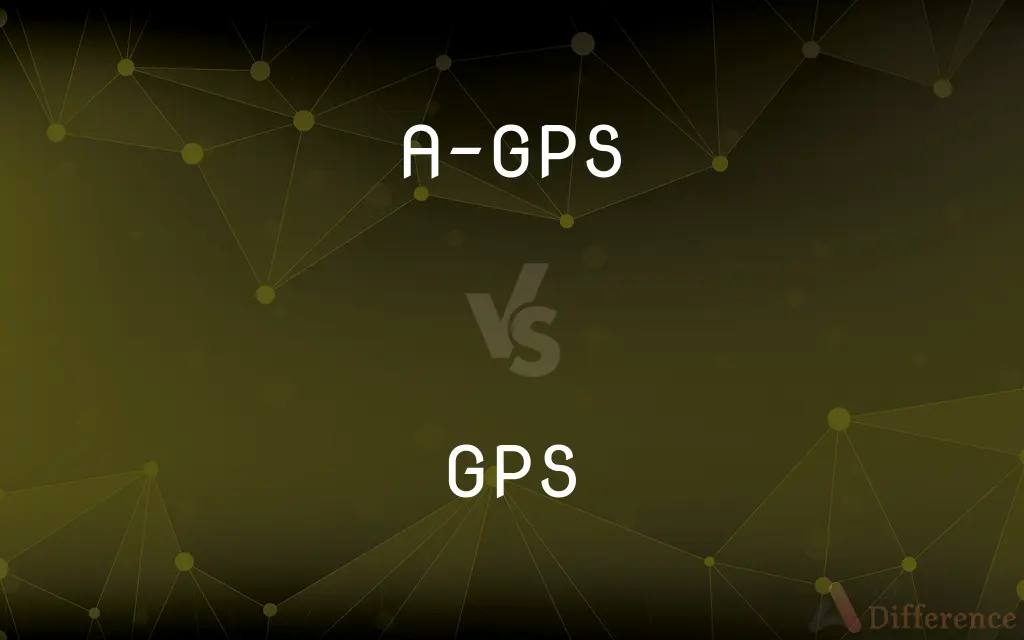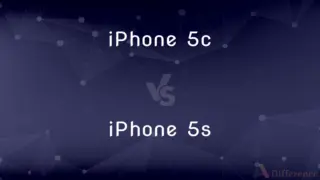A-GPS vs. GPS — What's the Difference?
By Tayyaba Rehman & Urooj Arif — Published on February 11, 2024
GPS (Global Positioning System) is a satellite-based navigation system, while A-GPS (Assisted Global Positioning System) enhances GPS by using additional data from cellular networks, providing faster and more accurate location information.

Difference Between A-GPS and GPS
Table of Contents
ADVERTISEMENT
Key Differences
GPS is a satellite navigation system that enables precise location tracking and navigation. It relies on a network of satellites orbiting the Earth, with GPS receivers on devices picking up signals from these satellites to determine the user's location. While effective in open-sky environments, GPS signals can face challenges in urban areas with tall buildings or areas with signal obstructions.
A-GPS, or Assisted Global Positioning System, improves upon traditional GPS by incorporating assistance data from external sources. In addition to satellite signals, A-GPS utilizes data from cellular networks, Wi-Fi, and other sources to enhance the speed and accuracy of location determination. This is particularly advantageous in scenarios where GPS signals alone might be weak or unreliable, such as urban canyons or indoors.
Comparison Chart
Data Source
Utilizes satellite signals and assistance data from cellular networks and other sources
Solely relies on signals from orbiting GPS satellites
Speed of Positioning
Faster positioning due to assistance data
May take longer to establish a precise location
Accuracy in Challenging Environments
More accurate in urban areas or locations with signal obstructions
May face challenges in urban canyons or indoors
ADVERTISEMENT
Initialization Time
Quick initialization, especially in assisted environments
Initialization time may vary, potentially longer
Common Usage
Common in smartphones, enhancing location services
Standard in various navigation and tracking devices
Compare with Definitions
A-GPS
Ideal for urban environments with tall buildings, providing reliable location information.
In crowded city centers, A-GPS excels by overcoming signal challenges and delivering accurate positioning.
GPS
Global Positioning System that relies on signals from orbiting satellites for location tracking.
GPS in outdoor activities like hiking provides accurate location information using signals from multiple satellites.
A-GPS
Enhances overall positioning performance, especially in scenarios where GPS signals are weak.
Hikers in dense forests benefit from A-GPS, which combines satellite and cellular data for accurate location tracking.
GPS
Common in navigation devices, ensuring accurate positioning in open-sky environments.
GPS is a crucial feature in aviation, guiding pilots with precise location information during flights.
A-GPS
Common in modern navigation systems, ensuring faster and more precise location services.
Car navigation systems often use A-GPS to provide real-time and accurate directions to drivers.
GPS
May experience challenges in urban areas or places with signal obstructions.
In densely populated cities, GPS signals can be affected by tall buildings, leading to occasional inaccuracies.
A-GPS
Utilizes assistance data to reduce initialization time, offering quick location acquisition.
A-GPS-enabled devices establish their location rapidly, even when satellite signals alone might be insufficient.
GPS
Reliable for outdoor activities like geocaching, where an unobstructed view of the sky is common.
Geocachers rely on GPS for accurate coordinates to find hidden treasures, typically placed in open environments.
A-GPS
Enhances location accuracy by combining satellite signals with data from cellular networks.
A-GPS on smartphones quickly determines the user's location by utilizing both satellite and cellular data.
GPS
Establishes location through a network of satellites orbiting the Earth.
GPS technology enables mobile devices to determine their users' locations, facilitating various applications.
Common Curiosities
Does GPS require an internet connection?
No, GPS does not rely on the internet. It operates using signals from orbiting satellites, providing standalone location services.
How does A-GPS improve location accuracy?
A-GPS enhances accuracy by combining satellite signals with assistance data from cellular networks, enabling faster and more precise location determination.
Are there situations where traditional GPS is preferable to A-GPS?
Traditional GPS may be preferable in open-sky environments where assistance data is unnecessary and initialization time is not a critical factor.
Can A-GPS function without satellite signals?
A-GPS relies on satellite signals, but assistance data from cellular networks complements and enhances the overall performance, especially in challenging scenarios.
Does A-GPS consume more battery than traditional GPS?
A-GPS may consume slightly more battery due to the additional use of cellular data, but advancements aim to minimize this impact.
Can GPS work indoors or in urban areas with tall buildings?
GPS signals may face challenges in urban areas or indoors due to signal obstructions, potentially leading to decreased accuracy.
Is A-GPS only used in smartphones?
No, A-GPS is employed in various devices, including car navigation systems, fitness trackers, and other location-based services.
Can GPS be affected by atmospheric conditions?
While GPS signals can be affected by atmospheric conditions, such as severe weather, modern receivers are designed to mitigate these impacts.
How does A-GPS reduce initialization time?
A-GPS reduces initialization time by utilizing assistance data from cellular networks, resulting in quicker location acquisition.
Is A-GPS necessary for everyday smartphone use?
While not essential, A-GPS enhances location services on smartphones, providing quicker and more accurate positioning, especially in challenging environments.
Does A-GPS require a constant internet connection for accurate location services?
A-GPS benefits from occasional internet access to update assistance data, but it can function without a continuous internet connection for basic location services.
Can GPS provide accurate location information in dense forests?
In environments with dense foliage, GPS signals may be obstructed, affecting accuracy. A-GPS can overcome some of these challenges.
How many satellites does GPS typically use for location determination?
GPS receivers typically utilize signals from at least four satellites to accurately determine the user's three-dimensional location.
Can GPS work underwater or in subterranean environments?
GPS signals cannot penetrate water or solid structures effectively, making it challenging for GPS to work reliably underwater or underground.
Is A-GPS more accurate than GPS in all situations?
A-GPS is often more accurate, particularly in challenging environments, but the degree of improvement depends on the availability of assistance data and satellite signals.
Share Your Discovery

Previous Comparison
Diego Maradona vs. Pelé
Next Comparison
iPhone 5c vs. iPhone 5sAuthor Spotlight
Written by
Tayyaba RehmanTayyaba Rehman is a distinguished writer, currently serving as a primary contributor to askdifference.com. As a researcher in semantics and etymology, Tayyaba's passion for the complexity of languages and their distinctions has found a perfect home on the platform. Tayyaba delves into the intricacies of language, distinguishing between commonly confused words and phrases, thereby providing clarity for readers worldwide.
Co-written by
Urooj ArifUrooj is a skilled content writer at Ask Difference, known for her exceptional ability to simplify complex topics into engaging and informative content. With a passion for research and a flair for clear, concise writing, she consistently delivers articles that resonate with our diverse audience.
















































